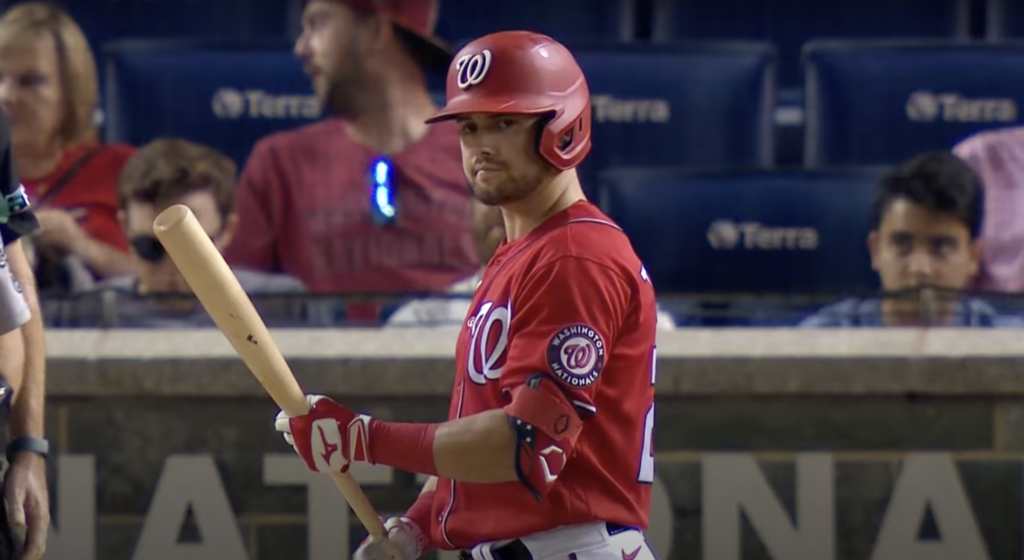‘Unparalleled Luxury’: Nationals Still Pitching Exclusive ‘Terra Club’
Months after the crash of UST and LUNA, a $38 million partnership between Terra and the Washington Nationals MLB team remains intact

Source: Washington Nationals
- The Nationals billed the February agreement as the first between a DAO and a sports franchise
- It is unclear whether Terra or the Nationals are seeking to exit the deal
Television watchers of the Washington Nationals’ home game against the Athletics Wednesday could still see Terra — the failed stablecoin protocol — branded in bold white font on the ample empty seats behind home plate.
There’s also an in-stadium venue, the “Terra Club,” which provides “unparalleled luxury” at Nationals Park, the MLB team’s website says. A Nationals ticket representative confirmed to Blockworks that the club still holds the Terra name.
The Terra Club offers pre-game meals for fans at its all-inclusive chef’s table before they head to their seats. But a fun day at the ballpark is likely no longer what crypto investors would associate with Terra, whose algorithmic stablecoin TerraUSD (UST) and LUNA token crashed several months ago.
Terra and the Washington Nationals revealed the sponsorship agreement in February, worth more than $38 million, in what the team billed as the first deal between a DAO and a sports franchise. The Nationals said in a statement at the time that UST could be accepted as a payment method at Nationals Park next season.
Terraform Labs Founder Do Kwon had urged the Terra community to partner with a then-unnamed sports franchise in a Jan. 31 proposal. The money would cover $7.5 million of annual fees for five years and $650,000 to cover construction, renovation and redesign costs, he said.
The Terra-Nationals agreement appears to remain in place despite the crypto company’s tarnished reputation. It is unclear whether Terra or the Nationals are seeking to exit the deal.
Spokespeople for Terraform Labs and Washington Nationals did not return requests for comment.
 Terra and its logo seen littered behind home plate at a recent Nationals game. Source: MLB
Terra and its logo seen littered behind home plate at a recent Nationals game. Source: MLB
Terra’s LUNA coin was the ninth-largest by market capitalization at the time of the deal, worth roughly $23 billion, while UST was ranked 18th at $11.2 billion. Both tokens have collapsed almost entirely since UST de-pegged from the dollar, with the new LUNA iteration garnering less than $300 million in nominal value.
A drop in liquidity made it easier for an attacker to push UST off its $1 peg on May 7. In an interview with Coinage last month, Kwon said he “should have known the risks of UST much better.” He added that the next incarnation of the Terra blockchain will be more community focused.
Crypto in sports goes far beyond the Terra-Nationals deal
Nationals Park aside, crypto companies with less reputational damage remain in the public eye at sports venues.
The New York Mets, a division rival of the Nationals, has the Tezos blockchain brand around its home stadium, Citi Field. Mets owner Steve Cohen is laying the groundwork for an investment firm focused exclusively on cryptocurrency, sources told Blockworks last month.
Perhaps most notably, Crypto.com in December bought the naming rights to the professional sports arena in Los Angeles — home of the Lakers, Clippers, Kings and Sparks — formerly known as the Staples Center. The 20-year deal cost the company $700 million.
Nine months earlier, rival crypto exchange FTX secured a whopping 19-year branding deal for NBA team Miami Heat’s home stadium, worth $135 million. Major League Baseball umpires continue to wear an FTX patch on their uniforms stemming from the league’s deal with the crypto exchange that began last year.
SportBusiness reported Wednesday that a potential deal between Crypto.com and the UEFA Champions League — estimated to be worth about $100 million per season — fell through in May. The cause of the negotiation halt was thought to be due to legal advice Crypto.com received about the scope of its licenses to trade and operate based on conversations with European regulators, sources told the media outlet.
A spokesperson for the company declined to comment.
Though some crypto companies told Blockworks in July they were implementing cost-saving measures due to the segment’s downturn, others said they were doubling down on advertising spend.
Get the news in your inbox. Explore Blockworks newsletters:
- The Breakdown: Decoding crypto and the markets. Daily.
- 0xResearch: Alpha in your inbox. Think like an analyst.






